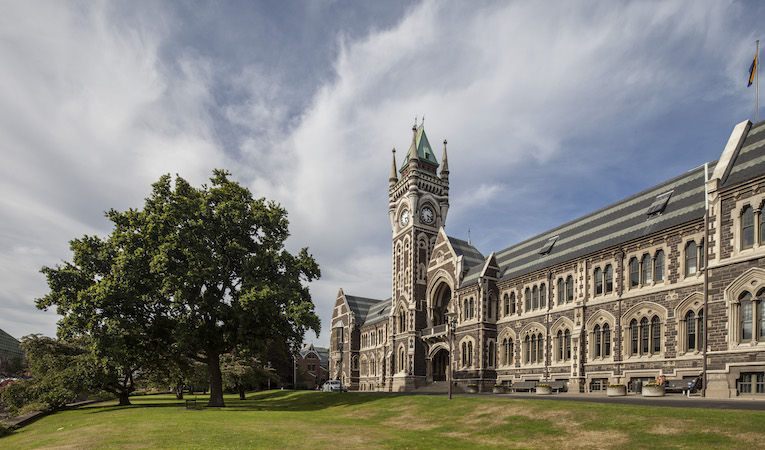Kiwi Education only works with schools certified by the New Zealand Education Regulatory Body (NZQA). We always make sure of the quality of teaching and that schools meet the quality standards we offer our customers. In New Zealand it is possible to divide educational institutions into 4 groups, with specific characteristics.
Public Universities
They are the most prestigious universities in New Zealand , but also the ones that require the greatest investment. Universities offer courses with a lot of academic knowledge and professors of the highest qualification. The campuses are practically a city, with all the necessary infrastructure: food court, laundry services, student residences and even medical services. The number of local students is far greater than international students, which helps in immersing the student in the local culture and developing the connections needed for a professional and personal future. In other words, it is a high investment, but effective for the future.
Costs of courses at public universities: between NZ$25,000-35,000 per year.
Polytechnic Institutes
Prestigious and more accessible education for international students than Public Universities. Polytechnic Institutes are also funded by the government and, as a rule, offer a combination of academic and practical skills focused on the labor market. A large number of teachers are specialists in the professional field and possess a high level of knowledge. It is an excellent learning environment with study content and modern equipment.
Cost of courses at Polytechnic Institutes: between NZ$16,000-25,000 per year.
Private Institutions – Category 1 (NZQA)
As recognized as the Polytechnic Institutes, they offer the best cost-benefit ratio for the international student. The variety of courses is a little smaller than that of public institutions, but with regard to the courses that are offered, the quality is excellent. Campuses are generally more modern than public institutions, and the faculty includes highly educated professionals. Generally, they have strong connections with the industry and partnerships with several companies and therefore the employability of graduate students is high. The vast majority of students at private institutions are international, but it is possible to find some local students.
Cost of courses in category 1 private institutions: between NZ$12,000-25,000 per year.
Private Institutions – Categories 2 and 3 (NZQA)
They are the most affordable institutions for international students. As a rule, they have less prestige than other institutions, but they still offer international students the same study and work visa conditions. The variety of courses is usually summarized in the areas of Business, IT and Hospitality. They offer hands-on learning and generally have a study model that focuses on independence and student support. The faculty is composed of professionals with knowledge of the study environment.
Kiwi Education has partnerships with the best institutions in these categories, which aim to evolve and reach higher categories.
Cost of courses for private institutions of category 2 and 3:NZ$8,000-16,000 per year.
What is the importance of the educational institution after graduation and in the search for the first job?
Over years of experience in the New Zealand educational market, the Kiwi Education team agrees that New Zealand employers analyze a candidate’s data in the following order:
Visa
This is the first cutoff point in a candidate’s analysis. Most employers don’t want to have to worry about visa conditions for their employees. They usually look for people who already have the right to work in the country and offer assistance in applying for a visa for highly specialized people.
Local experience and references
Specifically for New Zealand, there is a very important point about recommendations from local employers. Employers, most of the time, look for professionals who are already adapted to the local environment, who have already gone through the adaptation period and are ready to work. Therefore, we always recommend our students to look for employment opportunities even in areas that require less qualifications to enter the labor market, or even volunteer activities during the duration of studies. This will not only help the student to adapt to the local working environment, but also to have professional references that can be consulted for a permanent position in the future.
Professional skills
Employers are looking for professionals who have certain clear and specific skills. Possessing the desired skills for a position and displaying them correctly on the resume will help an employer select the candidate for an interview.
Work experience in multinational companies
Of course, the qualifications and professional experience acquired in your home country will help you play a positive role in finding a new job, but a work experience in multinational companies known around the world can be a positive point for you stand in front of other candidates.
Personal profile
In New Zealand more than 80% of companies, even multinationals, are companies with a maximum of 10 employees. This makes the work environment more informal and all employees have some connection with each other. The vast majority of employers, in these cases, prefer to hire people whose opinions and lifestyle will be in agreement with those of the group.
Therefore, it is not uncommon to see some personal and personality requirements listed in the job openings. It is always very important to pay attention to this detail and understand the position of the company, in addition to all the criteria of the vacancy, in order to apply for it.
Prestige of educational institutions
Perhaps one employee or another will prefer degrees from the most highly regarded institutions in New Zealand and/or the world. However, this criterion is usually evaluated after all others listed above. At the same time, in academic, scientific, medical, and some other very specific fields, the prestige of education can play a much more important role.
Thus, the prestige of the educational institution plays a role in the search for opportunities in the labor market, although it is not among the main criteria. If the student can invest in a more prestigious institution, the choice for a significant place of study will be worth not only for the curriculum but also for the quality of content and even infrastructure and comfort throughout the process.
On the other hand, for study and work visa plans, the prestige of the institutions is not the most important point in the process. This is one of the main questions that Kiwi Education individually assesses the student’s goals and needs, for the selection and presentation of courses and institutions and teaching.
What is the importance of the city chosen during the study period?
Auckland attracts the majority of students looking not only for education but also for the possibility of work. It is a fact that in the largest city in the country you will find the greatest number of job opportunities. In other regions, outside Auckland, there is a smaller number of job offers, but competition will also be proportionally lower. The choice of city for study usually has great influence depending on the scope of your activities or area of expertise.
Universities located in cities other than Auckland offer several advantages such as:
- Lower cost of living.
- More domestic students (especially at public universities) and better connection and interaction in local culture.
- The main campuses of the country’s largest institutions are not in Auckland and therefore they offer a greater variety of courses and larger, more structured campuses.
- Availability of exclusive programs and study plans.
The final choice of an institution for your study plan is always yours.
Do not hesitate to ask your representatives questions and clear all your doubts, because the right choice will determine the next steps for your future.
CatEight.com will be happy to help you get the best deals in addition to the entire selection process and proper documentation for you to enter any educational institution in New Zealand.







